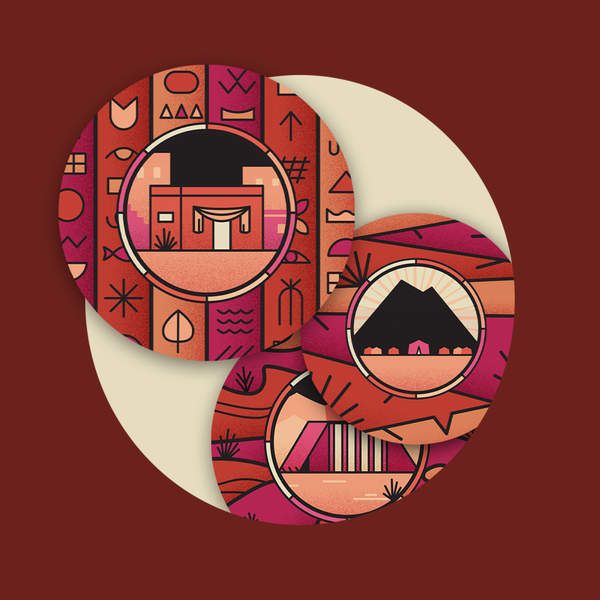A burning bush, a split sea, and a blueprint for God’s own tent—the Exodus scroll tells the story of Israel becoming a nation and sets the stage for the rest of the biblical narrative. In this podcast series, Tim and Jon explore three central patterns in the Exodus scroll.

God is not a name—it’s a title. In fact, the God of the Bible introduces himself by a specific name in one of the most famous stories in the Bible, the exodus event, when he works through Moses and Aaron to deliver Israel from slavery in Egypt. In this episode, Tim and Jon dive into the first movement of the Exodus scroll and explore the theme of God’s name.

The story of the Israelites’ exodus from Egypt is famous for good reason—a burning bush, a transforming staff, 10 plagues, and the Passover. The exodus is also the story that defines God’s personal name, Yahweh. What does this narrative show us about Yahweh? And why does God care so much that people know his name? In this episode, Tim and Jon talk about God’s character revealed through his acts of deliverance and judgment.

The ten plagues—they’re fascinating, they’re famous, and they sometimes seem overly harsh. Where do they fit in the story of the Bible and the process of God revealing his own name and character? In this episode, Tim and Jon talk about the ten plagues, or ten acts of de-creation, in which Yahweh uses his power over creation to undo his own creation in judgment. Listen in as we explore how God’s response to evil reveals another layer of his character.

Nobody likes tests. But the test is a recurring pattern in the biblical story for how God relates to his chosen ones. So are humans just lab rats in a divine experiment, or is there something else going on? Join Tim and Jon as they talk about the theme of the test and the famous account of Israel crossing the Sea of Reeds, as we dive into the second movement of the Exodus scroll.

The nation of Israel seems to go from one life-threatening situation to another in the Exodus scroll. From slavery in Egypt to being cornered between a hostile army and a vast body of water, Israel’s God has delivered them from everything so far. Now in the wilderness, they face a series of three tests. Will they trust Yahweh to deliver them again? In this episode, Tim and Jon explore Israel’s testing in the wilderness.

Mount Sinai is the famous spot where Yahweh gives Moses the Ten Commandments, and it is the location where most of Exodus, all of Leviticus, and the first 10 chapters of Numbers take place. When Israel first arrives at Sinai, they fail yet another test and try to get Moses to pass it for them. In this episode, join Tim and Jon as they explore Yahweh’s fiery presence, the test at Sinai, and the question of Israel's national identity: Will they be the kingdom of priests Yahweh intends?

We often think of the Ten Commandments as a list of dos and don’ts—the things you need to do to make God happy. But is that what they’re really about? In this episode, join Tim and Jon as they take a deep dive into the Ten Commandments and find out why they’re more about preserving proper worship of Yahweh and the shared dignity of humans.

You may have heard that God’s holiness keeps him from getting close to sinful humanity, but in the Bible we see God regularly doing the opposite, drawing near to dwell with human beings. We encounter this reality again and again, including in a surprising place—the tabernacle blueprints. In this episode, join Jon and Tim as they walk through the opening act of the third movement of Exodus and explore the relationship between the tabernacle, the garden of Eden, unconditional love, and eternal life.

Why does God seem to care so much about the furniture within the tabernacle? The instructions for the tabernacle furniture are about far more than aesthetics. They were means of dealing with Israel’s moral brokenness, they served as reminders of Eden, and they were designed to form Israel into a people of perpetual surrender. In this episode, join Tim and Jon as they continue to trace the theme of the temple in the third movement of Exodus.

In the second movement of Exodus, Moses walks straight into God’s fiery presence on Mount Sinai without fear. But by the end of the scroll, he can’t enter God’s presence. What changed? In this episode, join Jon and Tim as they explore the final portion of the third movement of Exodus.

Did Israel pass or fail God’s test at Mount Sinai? And what did Yahweh mean when he made Israel a “nation of priests”? In this episode, Tim and Jon talk with long-time friend and Hebrew Bible scholar Dr. Carmen Imes. Tim and Carmen share differing interpretive perspectives of the Exodus story, reminding us that the Bible is meant to be meditated upon and studied within a community.

Why did God say he was going to kill Moses? What exactly was God’s test for Abraham on Mount Moriah and Israel on Mount Sinai? What’s the connection between the ten plagues and the Ten Commandments? In this episode, Tim and Jon respond to your questions about the Exodus scroll. Thanks to our audience for your incredible questions!

